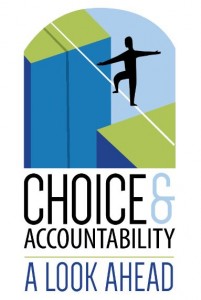
Editor’s note: This is the sixth and final post in our series on the future of parental choice and accountability.
by Thomas Arnett
The issue of standards and test-based accountability has been an important topic in education reform for more than a generation. With the passing of the No Child Left Behind Act (NCLB) in 2001, it became a central component of our education policy. In the intervening years since Congress signed NCLB into law, we have been able to observe both its benefits and its flaws.
Test-based accountability has been extremely important for raising awareness of the achievement gaps between low-income and minority students and their more affluent peers, and it has led to notable gains in closing those gaps. But at the same time, critics have virulently attacked high-stakes testing for putting undue performance pressure on teachers and students, and for incentivizing schools and teachers to narrow their curriculum to the exclusion of non-tested subjects. Aside from these debates, there has been a simultaneous and separate strand of education reform centered around educational choice options – such as charter schools, voucher programs, tax credit scholarships, education savings accounts, and more recently, full-time virtual schools and online courses – that move beyond school choice to allow any student within any school to have nearly unlimited educational options. These moving pieces need to be at the forefront of our minds as we ask ourselves how accountability should evolve over the next decade.
As a helpful starting point, we should reframe the way we look at these challenges. Rather than viewing school choice as a reform issue separate from school accountability, we should recognize that choice is a powerful mechanism for providing bottom-up accountability. Kathleen Porter-Magee, a policy fellow at the Fordham Institute, expertly conveyed this point in a recent blog. She argues that we need to “broaden our conception of accountability to include parental choice” and that “parent choice provides a much-needed counterbalance to the potential excesses of standards-driven reform.” Parental choice gives us a way to hold schools accountable for the aspects of education that are hard to quantify, such as the quality of non-academic programs, school culture, and the relationships between teachers and students.
To make this kind of bottom-up accountability work, parents need good information about their choices. In this regard, standardized assessments are actually an important mechanism for informing parents.
The theory behind school choice is rooted in a fundamental tenet of capitalism: that the invisible hand of market competition is superior to that of managerial oversight as a coordinating mechanism between actors in a market. Nevertheless, for this mechanism to work, the people who participate in the market have to have good information about their choices. Parents cannot make good decisions regarding where to enroll their students if they do not have the information they need to make meaningful comparisons between their options.
In the absence of school performance data, parents are left to make decisions based solely on bias-prone information sources such as outward appearances, the opinions of other parents, and school marketing materials. As Mike Petrilli and Chester Finn of the Fordham Institute explained in an article in The Weekly Standard last summer: “Standards do a good job of clarifying the public’s expectations for schools, and signaling to parents and taxpayers whether the campus down the street is educating its students poorly or well. … Market-based reform needs reliable consumer information for it to lead to strong outcomes—information that standards and tests are excellent at providing.”
As we look to the future, what should we do to improve our current system of assessment and accountability? One valuable step forward would be to move to a system that makes information available to parents on-demand. By analogy, our current assessment system is like the fuel economy stickers found on cars at an auto dealership. It provides a single snapshot that only tells us average performance over a wide variety of conditions. What we need in education is something akin to the energy efficiency dashboard displays that are now standard in most new hybrid and electric cars. These displays show you exactly how your car is performing at any given moment, thereby allowing you to evaluate performance across the entire spectrum of driving conditions and driver habits.
So how could we make this kind of real-time information available in education? We need a competency-based system with online assessments that can be accessed on-demand throughout the school year and an online portal that makes it easy for parents to view and interpret the assessment data. Giving parents this kind of data would enable them to be much stronger advocates in their children’s education. They would no longer have to rely on ambiguous, teacher-assigned letter grades at the end of a semester, or state test scores at the end of the year, to try to figure out what is happening with their children’s learning from day-to-day. Such a system could also provide better accountability for new learning options, such as a la carte courses, that are not necessarily provided by a traditional school or aligned to the traditional school year.
On-demand, competency-based assessments would also have profound implications for focusing accountability on the individual growth of each child. A challenge with today’s snapshot-in-time system is that it does not give teachers or schools credit for helping disadvantaged and advanced students. Currently, we do not recognize the gains of a student who comes to school three years behind grade level and then makes two grade levels of growth over the course of a single school year because that student still falls below the “proficiency” bar. Similarly, the achievement of an 8th grader who is mastering calculus topics will not show up on the end-of-year exam for her grade level. For these reasons, on-demand, competency-based assessments would do a much better job at facilitating true accountability by presenting a much clearer picture of true quality.
There are still many logistical, technical, and policy questions that need to be figured out in order to provide accountability through an on-demand, competency-based assessment system. Nevertheless, as we solve those problems, it will be exciting to see how such a system empowers parents and transforms accountability over the course of the next 10 years.
Thomas Arnett is a research fellow in education at the Clayton Christensen Institute for Disruptive Innovation.



So your answer is to test more? You must not be aware of districts that already do this to some extent. Ours tested students online all year. The had FAIR, they had FCAT, then EOCs. The kids were so burned out from testing, they didn’t even care anymore. You touch on these factors, then go into a spiel about school choice, then go back on your testing tirade. Also, while I’m not completely against choice, when you make choice the norm, however, you pull all of the kids whose parents care about their education out of “bad” schools, and leave all of the kids with uninvolved parents there. This isn’t solving educational problems, it’s just redistribution.